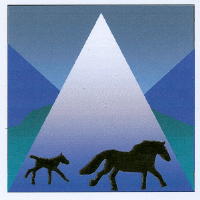Hair Care: Supplementing Fats
/I recently had visitors who were new to Fell Ponies. They asked about hair care. They observed the long manes on my ponies that were free of tangles, and they asked how often I brush them. ‘Almost never’ was my reply. I have found that the best way to get healthy and silky hair – coat but also mane, tail, forelock and feather – is to feed for it. Then whenever I see a tangle starting to develop in the mane, rarely more often than every few weeks, I take the tangle out.
Here’s how I feed for healthy hair:
Balanced and comprehensive vitamins and loose, free-choice minerals
Copper supplementation (click here for a blog post on that topic)
Good quality fats
It has always puzzled me why people add oils like corn and soybean to their equines’ rations. Oils are the farthest thing from natural in an equine diet. But then I read the following: “Fat from any source will make your horse shiny…. Any fat will do; the type of dietary fat doesn’t matter when it comes to making the hair coat shine…” (1) So that explains one reason why people add oils to their equines’ diets: shiny coats. Another explanation is likely that the equine’s owner is making a laudable attempt to replace starches and sugars in their equines’ diets with fat as an energy source.
But then the quote above had an important caveat. “Any fat will do; the type of dietary fat doesn’t matter when it comes to making the hair coat shine – but it sure does matter when it comes to your horse’s health.” The point here is that a proper balance between Omega 3 and Omega 6 fatty acids is crucial for equine health, just as it is for people.
Pasture/grass has the proper balance. Finding equally balanced supplementation when our equines do not have access to fresh grass can be more tricky. Corn and soybean oil are heavy on the Omega 6s which can lead to inflammation if fed in sufficient quantity. Flaxseed has been fed to equines since at least the 1850s. It is gaining popularity because it has a more favorable ratio, but how flaxseed is fed is crucial to its effectiveness. But there are benefits of special interest to pony owners who are vexed by a problem some ponies face. Researchers at the University of Guelph in Canada “found evidence that the fatty acid source flaxseed can potentially reduce the allergic inflammatory response in horses susceptible to biting midges (Culicoides),” also known as sweet itch. (2) “Also, omega-3s could have beneficial effects for horses suffering from inflammatory diseases such as heaves and osteoarthritis. Researchers have not yet determined the exact physiological mechanism to these benefits, and more research is needed to further examine flaxseed’s role in immune response.” (3)
Another Omega 3 source starting to show up in equine rations is chia seed. It is higher in Omega 3s than flaxseed and is more digestible without processing. Chia seeds are an ancient grain of the Aztecs and Mayans. “Legend has it that when the Spanish conquered Mesoamerica, they banned the seeds, attributing the fierceness of the indigenous warriors to a diet of chia.” (4) “Unlike flaxseeds, chia seeds have softer hulls and can be fed whole. While chia seeds are likely to have similar benefits as other Omega 3 sources, no scientific research has been conducted on feeding them to horses.” (5)
There are other sources of healthy fats available for equines such as fish oil and whole extruded soybean meal, but as with flaxseed, the key is in the preparation to make them both palatable and nutrient-dense. Because my ponies are off fresh grass part of the year, I make sure they get good fats when they need them. I attribute the health of my ponies’ hair in part to the quality of the fats that I feed them.
Getty, Juliet M., PhD. “Myth: A Shiny Horse is a Healthy Horse,” Horse Journals, 5/21/14, at https://www.horsejournals.com/myth-shiny-horse-healthy-horse
Getty, Juliet M. PhD. “Feeding for Immunity,” the Horse, 12/3/12, article #118796 at thehorse.com
Janicki, Kristen M. “5 Facts about Flax,” the Horse, 7/15/19, article #148473 at thehorse.com
“Flaxseeds or Chia Seeds: Which do I feed my Horse?”, Biostar, 7/31/17 at https://www.biostarus.com/blogs/formulators-corner/flax-seeds-or-chia-seeds-which-do-i-feed-my-horse
Moore, Jennifer, PhD. “Top Sources of Omega 3 Fatty Acids for Horses,” Equine Wellness, Jan/Feb/Mar 2020, p. 40
© Jenifer Morrissey, 2020



